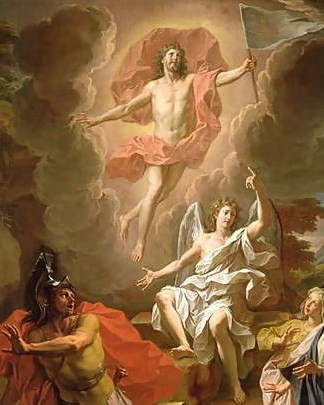The Resurrection: So what? Part I
 I’d
like to spend some time exploring the significance of the resurrection in the
New Testament. When I began exploring this idea, I was surprised. It is
shocking how little the New Testament spends on the subject. I would have
expected much more emphasis upon the consequences of the resurrection of Jesus
among the primitive Christians. The seminal work by NT Wright (The
Resurrection of the Son of God) is certainly the place to where everyone
must go to learn of resurrection in ancient Greek and Jewish thought. My
understanding has been greatly enhanced by his work on this issue.
I’d
like to spend some time exploring the significance of the resurrection in the
New Testament. When I began exploring this idea, I was surprised. It is
shocking how little the New Testament spends on the subject. I would have
expected much more emphasis upon the consequences of the resurrection of Jesus
among the primitive Christians. The seminal work by NT Wright (The
Resurrection of the Son of God) is certainly the place to where everyone
must go to learn of resurrection in ancient Greek and Jewish thought. My
understanding has been greatly enhanced by his work on this issue.
First, let’s be clear what
“resurrection” means when used of Jesus: it means the act
of God by which dead persons receive new, physical, incorruptible,
Spirit-animated bodies. This is the only way the term is used among the
Jews who believed in it (Greeks and Romans had no such belief). Therefore,
resurrection never means “to live in glory” or “to go to
Heaven." And it's also important to note that while "raised from the dead" and "resurrection" in the Greek New Testament can refer to both resuscitation
and resurrection, when referencing Jesus's post-death experience, it always refers to receiving a
new, incorruptible body.
Only
certain streams of Judaism espoused such a belief (e.g., we know the Sadducees
didn’t, based on Josephus and the NT). And for those who did, it’s not always
clear who they expected to be resurrected: all people, all Jews, faithful Jews,
or their group of Jews. Notice how even Paul hopes to be given the gift of resurrection
(Phil 2:11). What they all had in common was the belief that
resurrection would only occur (1) at the end of time, before judgment and (2)
as a corporate event, i.e., no individual would be raised apart from the whole
group.
Only in late forms of ancient
Judaism does the idea initially occur. For example, Josephus (a Jewish
historian who worked for the Romans) believed in resurrection. Daniel 12:2
(which is in the last section to be written in the OT) speaks of resurrection.
The author of 2 Maccabees and/or some of the Maccabean martyrs believed that
God would reward their not breaking the Mosaic Law with the gift of
resurrection (see 2 Macc 7, esp. v. 9-23). One also finds the idea in the
Jewish apocalypse of 2 Ezra (4 Esdras) 2:16 and 7:37. Later rabbis seemed to
have believed in the resurrection (e.g., Mishnah 10.1, which states that those
who do not believe in the resurrection will not
be allowed into the world to come).
For the earliest
Jewish-Christians, the resurrection of Jesus was the watershed moment of
history. Instead of resurrection only occurring to a group of people, it
occurred to one person before the rest of us are raised. This is why Paul uses
the metaphor of “first fruits” – Jesus is first, the rest of us second (1 Cor
15:20, 23). And because the resurrection only occurs at the end of time, it
must mean that the end of time has come upon us. Paul uses the image of being
“in the day” to refer to the new
day of the New Age that has
begun (see e.g., Rom 13:11-14; 1 Thess 5). The outpouring of the Holy Spirit
was the proof that the New Age had begun, since it was believed that at the end
of time God would send out a new outpouring of His Spirit (Joel 2:29; see Acts
2:17-21).
There’s no doubt that the
resurrection was considered crucial in the formation of the earliest Jesus
movement. In fact, denying the resurrection made (and makes) the Christian hope
nonsense and false (as Paul argues in 1 Cor 15). Without the resurrection,
there is no causal explanation for the explosion of the Christian movement from
within first century Judaism. All other conspiracy theories simply do not have
the causal explanatory power or explanatory scope to explain why the earliest
followers of Jesus believe that they should pray to Jesus as God, get baptized
in His name, believe that they could heal people in Jesus’s name, worship Jesus
as living Lord, and claim that He is, indeed,
the Messiah.
In my next post I want to explore
the ways the NT documents speak of the significance of the resurrection. That is, I want
to examine the “so what?” question. Like I said in the beginning, I was a bit
surprised as to what I discovered.


